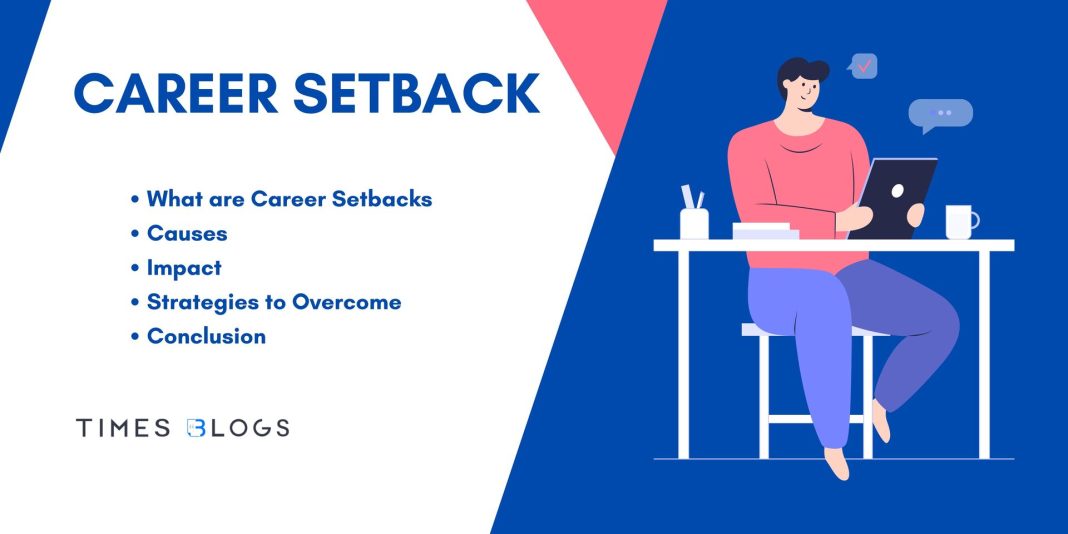Introduction
Career setbacks are common occurrences that many professionals face at some point in their career journey. These setbacks can be challenging and can significantly impact one’s professional life. While they can be discouraging, career setbacks can also provide valuable learning experiences and opportunities for personal and professional growth. In this blog, we will explore what career setbacks are, their causes, their impact on an individual’s career, and strategies to overcome them.
What are Career Setbacks?
Career setbacks refer to negative events or circumstances that hinder an individual’s progress in their professional life. These setbacks can be sudden and unexpected, or they can arise from a long-standing problem that has finally come to a head. Some examples of career setbacks include being fired or laid off from a job, receiving a negative performance review, not receiving a promotion, or experiencing a failed project.
Causes of Career Setbacks
Career setbacks can have various causes. Some of the common causes of career setbacks include:
- Personal and Professional Issues: Personal problems like health issues, financial challenges, or family problems can negatively impact one’s professional life. For example, an employee experiencing personal problems may be less productive, leading to poor performance reviews and ultimately job loss.
- Changes in Industry: Changes in the industry, such as the introduction of new technologies or the adoption of new business models, can make some skills and knowledge irrelevant. Individuals who do not adapt to these changes risk being left behind, leading to career setbacks.
- Economic Downturns: Economic downturns can lead to layoffs and job losses as companies downsize to cut costs.
- Poor Work Performance: Poor work performance can lead to negative performance reviews and missed opportunities for promotions or career advancement.
Impact of Career Setbacks
Career setbacks can have a significant impact on an individual’s professional life. Some of the impacts include:
- Emotional Distress: Career setbacks can be emotionally draining and can lead to feelings of discouragement, self-doubt, and anxiety.
- Financial Challenges: Career setbacks can lead to financial difficulties, especially if the individual has lost their job or suffered a pay cut.
- Career Stagnation: Career setbacks can lead to stagnation and a lack of career growth. An individual may find it challenging to progress in their career after experiencing a setback.
Strategies to Overcome Career Setbacks
The path to career success is not always a smooth one. Many people experience setbacks and failures along the way, whether it’s a job loss, a failed project, or a missed promotion. These setbacks can be disheartening and demotivating, but they can also be opportunities for growth and learning. In this blog, we will explore strategies for bouncing back from a career setback and turning it into a stepping stone for success.
- Take time to process your emotions:
The first step in bouncing back from a career setback is to take time to process your emotions. It’s natural to feel disappointed, frustrated, or even angry when things don’t go as planned. However, it’s important not to dwell on these emotions for too long. Give yourself time to acknowledge and process your feelings, but then shift your focus to the future.
- Identify the root cause of the setback:
Once you’ve processed your emotions, it’s important to reflect on the root cause of the setback. Was it something that was within your control, or was it outside of your control? What could you have done differently to prevent it? Be honest with yourself and take responsibility for your role in the setback.
- Reframe the setback as an opportunity for growth:
While setbacks can be painful, they can also be opportunities for growth and learning. Reframe the setback as a chance to learn from your mistakes and to develop new skills and competencies. Look for the silver lining and focus on the positive aspects of the situation.
- Set new goals and create a plan:
Once you’ve reframed the setback, it’s time to set new goals and create a plan for achieving them. Identify what you want to achieve and what steps you need to take to get there. Break your goals down into smaller, achievable milestones and create a timeline for achieving them. This will help you stay motivated and focused on the future.
- Network and seek support:
It’s important to surround yourself with a strong support system as you bounce back from a career setback. Reach out to friends, family, and colleagues for emotional support and advice. Network with professionals in your field and seek out mentors who can provide guidance and help you make new connections.
- Take action:
Ultimately, the key to bouncing back from a career setback is to take action. Be proactive in pursuing your goals and taking steps to overcome any obstacles in your way. Stay motivated and focused on the future, and don’t be afraid to take calculated risks to achieve your goals.
- Develop resilience:
Resilience is the ability to bounce back from adversity and to thrive in the face of challenges. It’s an important trait to develop as you navigate the ups and downs of your career. To develop resilience, focus on building your self-confidence, developing a growth mindset, and cultivating a positive attitude. Learn to see setbacks as opportunities for growth and focus on the lessons you can learn from them.
- Seek feedback:
Feedback is an important tool for growth and development. Seek feedback from colleagues, mentors, and supervisors to help you identify areas for improvement and to learn from your mistakes. Be open to constructive criticism and use it to fuel your growth and development.
- Learn new skills:
The world of work is constantly evolving, and it’s important to stay up-to-date with the latest trends and technologies in your field. Use setbacks as an opportunity to identify areas where you need to develop new skills and competencies. Take courses, attend conferences, and seek out opportunities for on-the-job training to help you stay relevant and competitive in your field.
- Practice self-care:
Finally, it’s important to practice self-care as you bounce back from a career setback. Take care of your physical and emotional health by getting enough sleep, exercising regularly, and practicing stress-management techniques
such as meditation or mindfulness. Take time to do things that bring you joy and help you relax, such as hobbies or spending time with loved ones. When you prioritize your well-being, you’ll be better equipped to handle the challenges and stresses of your career.
Conclusion:
Experiencing a setback in your career can be discouraging, but it doesn’t have to derail your success. By taking time to process your emotions, identifying the root cause of the setback, reframing it as an opportunity for growth, and taking action to achieve your goals, you can bounce back stronger than ever. Developing resilience, seeking feedback, learning new skills, and practicing self-care can also help you overcome setbacks and thrive in your career. Remember that setbacks are a natural part of the career journey, and with the right mindset and strategies, you can turn them into opportunities for growth and success.




